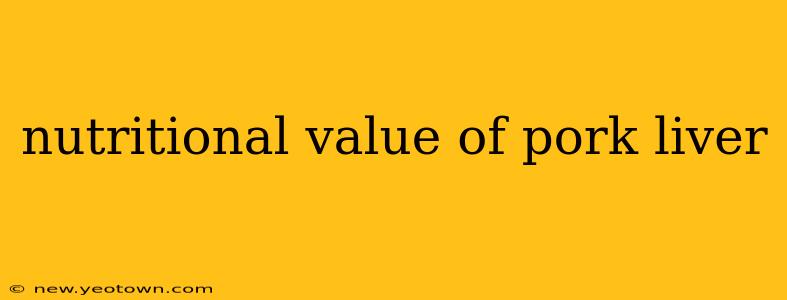The Nutritional Powerhouse: Uncovering the Hidden Benefits of Pork Liver
Pork liver, often overlooked in modern diets, is a nutritional powerhouse packed with essential vitamins and minerals. For generations, it's been a staple in many cultures, prized for its rich flavor and incredible health benefits. But beyond its culinary appeal lies a treasure trove of nutrients that can significantly contribute to a balanced and healthy lifestyle. Let's delve into the fascinating world of pork liver and uncover its surprising nutritional value.
What are the health benefits of eating pork liver?
The health benefits of pork liver stem directly from its impressive nutrient profile. It's an excellent source of high-quality protein, crucial for building and repairing tissues. But the real magic lies in its abundance of essential vitamins and minerals often lacking in modern diets. We're talking about significant amounts of Vitamin A (as retinol), Vitamin B12, iron, copper, and folate – all vital for various bodily functions. Regular consumption of pork liver can contribute to improved energy levels, stronger immunity, and enhanced cognitive function.
Is pork liver high in cholesterol?
This is a common concern surrounding organ meats like pork liver. Yes, pork liver is relatively high in cholesterol. However, the impact of dietary cholesterol on blood cholesterol levels is less significant than previously believed. Recent research suggests that saturated and trans fats have a more pronounced effect on blood cholesterol. While moderation is key, the benefits of pork liver's other nutrients shouldn't be entirely dismissed due to its cholesterol content. Consulting with a healthcare professional or registered dietitian is always recommended, particularly for individuals with pre-existing health conditions.
How much iron is in pork liver?
Pork liver is exceptionally rich in iron, a vital mineral for red blood cell production and oxygen transport throughout the body. A single serving can provide a substantial portion of your daily recommended iron intake. This makes it particularly beneficial for individuals prone to iron deficiency anemia, a condition characterized by fatigue, weakness, and shortness of breath. However, it's crucial to remember that iron absorption can vary depending on individual factors and the presence of other nutrients in the diet.
What vitamins and minerals are in pork liver?
As mentioned, pork liver boasts a remarkable array of vitamins and minerals. Beyond iron, it's an excellent source of:
- Vitamin A (Retinol): Crucial for vision, immune function, and cell growth.
- Vitamin B12: Essential for nerve function, red blood cell formation, and DNA synthesis.
- Copper: Plays a vital role in iron metabolism, energy production, and connective tissue formation.
- Folate: Important for cell growth and development, particularly crucial during pregnancy.
- Selenium: A potent antioxidant that protects cells from damage.
How to prepare pork liver?
Preparing pork liver correctly is key to maximizing its flavor and minimizing any unpleasant taste or texture. Many find that soaking the liver in milk or buttermilk before cooking helps to tenderize it and reduce any gamey flavor. Pan-frying, sautéing, or slow-cooking are popular methods. Experiment with different recipes to find your preferred method of preparation. Remember to cook it thoroughly to ensure food safety.
Is pork liver good for weight loss?
While pork liver is calorie-dense and high in protein, its role in weight loss is complex. The high protein content can promote satiety and support muscle mass, which is beneficial for metabolism. However, portion control remains crucial. It's best incorporated into a balanced diet and regular exercise program rather than being solely relied upon for weight loss.
Conclusion:
Pork liver, despite its often overlooked status, is a nutritional champion. Its wealth of vitamins, minerals, and high-quality protein offers significant health benefits when consumed in moderation. Understanding its nutritional profile and incorporating it mindfully into a balanced diet can contribute to overall well-being. Always consult with a healthcare professional or registered dietitian before making significant dietary changes, especially if you have underlying health conditions.

